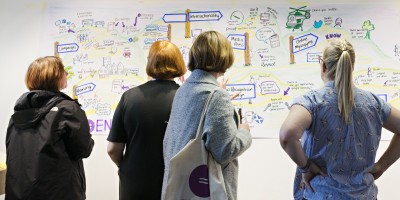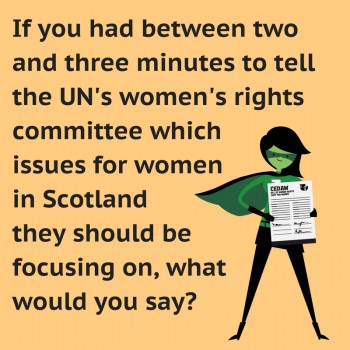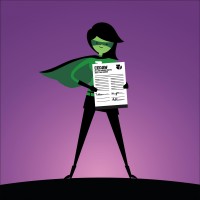Engender blog
CEDAW: How the UN Women’s Bill of Rights creates possibilities for women and girls in Scotland.
Engender members and other people who stay in touch with our work will know that we have been enabling organisations that care about women’s and girls’ equality to shadow the UN CEDAW process. The International Bill of Rights for Women is a key global human rights instrument for gender equality. The UK Government has just been examined by its dedicated UN CEDAW Committee to see how well the rights it provides for are being realised across the four nations of the UK.
We’ve written about the process, what happened during the examination, and annotated the concluding observations (or recommendations) that the Committee makes to UK Government. Here we’re going to summarise four of our reflections from the experience of working on CEDAW over the past two years.
CEDAW concluding observations: what do they mean for women in Scotland?
On March 8th 2019 the UN CEDAW Committee released their concluding observations following the UK examination in Geneva.
We've gone through these concluding observations and highlighted things which specifically relate to Scotland, and things which appeared in our CEDAW reports. You can read this annotated report here.
Gender Matters and #GenerationEqual: Shifting the needle on equality for women and girls

Eighteen months after our Scotland's Feminist Future conference and the launch of our Gender Matters Roadmap, our Executive Director Emma Ritch considers positive progress alongside the recently released first set of recommendations from the First Minister's National Advisory Council on Women & Girls.
Amid the weekly grind of Scottish Parliament committee sessions, working group meetings, consultations launching and closing, and streams of papers flowing in and out of the office, it’s a challenge for a policy and advocacy organisation like Engender to keep our focus on what lies over the horizon: a better world for women and girls.
Four things you need to know about CEDAW

This week, Engender's Executive Director Emma Ritch is in Geneva at the pre-sessional working group of the CEDAW Committee. To help you get your head around the mystery that UN Committees can appear to be, here are four things you need to know about CEDAW.
If you had between two and three minutes to tell the UN's women's rights committee which issues for women in Scotland they should be focusing on, what would you say? It's one of the odder tasks in women's rights advocacy, and one that we'll be taking on in Geneva in Monday.
1. CEDAW is the Bill of Rights for Women
The Convention for the Elimination of all forms of Discrimination Against Women (CEDAW) is a UN Convention that was developed at the tail end of the 1970s, and was ratified by the UK Government in 1986. Known as the international bill of rights for women, its articles include equal protection for women and equality of access to education, the law, political power and representation, economic resources and social security, and a whole raft of other areas of life. Like other international obligations, its legal status is somewhat murky when it comes to individuals. You can't go along to a Sheriff court in Scotland and assert your CEDAW rights, but courts can consider it when they're making some types of decision (for more info on how CEDAW could help women's rights be realised in Scotland, see our report here.)
The UN CEDAW Committee itself can also sit as a court of inquiry when systemic breaches of rights are taking place, or a kind of court of last resort when individuals have exhausted every legal remedy in their own state. There are some examples of this below.
CEDAW reports launched
Last night we were pleased to launch our shadow report on the UN Convention on the Elimination of All Forms of Discrimination Against Women (CEDAW), at a reception at the Scottish Parliament hosted by Christina McKelvie MSP, newly appointed Minister for Older People and Equalities.
Downloads
 Engender Briefing: Pension Credit Entitlement Changes
From 15 May 2019, new changes will be introduced which will require couples where one partner has reached state pension age and one has not (‘mixed age couples’) to claim universal credit (UC) instead of Pension Credit.
Engender Briefing: Pension Credit Entitlement Changes
From 15 May 2019, new changes will be introduced which will require couples where one partner has reached state pension age and one has not (‘mixed age couples’) to claim universal credit (UC) instead of Pension Credit.
 Engender Parliamentary Briefing: Condemnation of Misogyny, Racism, Harassment and Sexism
Engender welcomes this Scottish Parliament Debate on Condemnation of Misogyny, Racism, Harassment and Sexism and the opportunity to raise awareness of the ways in which women in Scotland’s inequality contributes to gender-based violence.
Engender Parliamentary Briefing: Condemnation of Misogyny, Racism, Harassment and Sexism
Engender welcomes this Scottish Parliament Debate on Condemnation of Misogyny, Racism, Harassment and Sexism and the opportunity to raise awareness of the ways in which women in Scotland’s inequality contributes to gender-based violence.
 Gender Matters in Social Security: Individual Payments of Universal Credit
A paper calling on the Scottish Government to automatically split payments of Universal Credit between couples, once this power is devolved to the Scottish Parliament.
Gender Matters in Social Security: Individual Payments of Universal Credit
A paper calling on the Scottish Government to automatically split payments of Universal Credit between couples, once this power is devolved to the Scottish Parliament.
 Gender Matters Manifesto: Twenty for 2016
This manifesto sets out measures that, with political will, can be taken over the next parliamentary term in pursuit of these goals.
Gender Matters Manifesto: Twenty for 2016
This manifesto sets out measures that, with political will, can be taken over the next parliamentary term in pursuit of these goals.
 Scottish NGO Briefing for UN Special Rapporteur on Violence Against Women
Joint briefing paper for the UN Rapporteur on Violence Against Women.
Scottish NGO Briefing for UN Special Rapporteur on Violence Against Women
Joint briefing paper for the UN Rapporteur on Violence Against Women.

Newsletter
Sign up to receive our newsletter here:
Sign up to our mailing list
Receive key feminist updates direct to your inbox:
